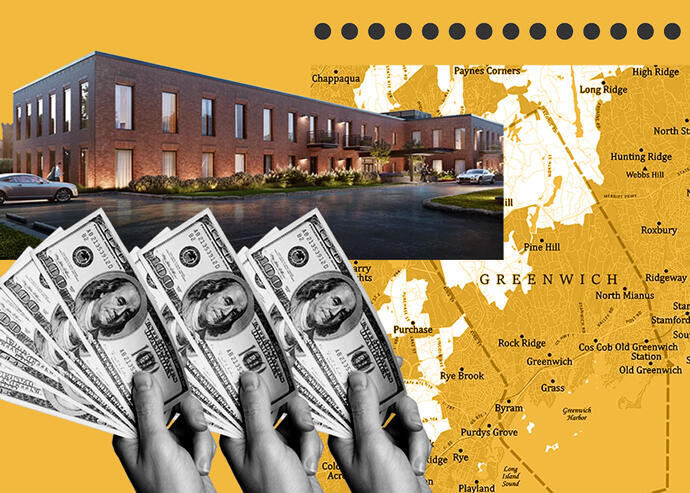
Greenwich rentals, like at The Mill (pictured), are in high demand (iStock, The Mill)
A few years back, Greenwich developer Steven Schacter ventured a bet that within one of the country’s most expensive real estate markets lay a dormant demand for luxury rentals.
Residents in the affluent Connecticut town skew older — nearly a quarter are seniors — and Schacter figured some empty nesters wanted more manageable digs. He and partner Eric Schwartz developed The Mill — two high-end apartment buildings equipped with concierge service at the town’s western edge.
Move-ins begin Aug. 15. But even before units were listed on Zillow, 600 prospective tenants had sent inquiries. As of June 1, The Mill had taken deposits for 60 percent of its 59 units, which range from $2,750 studios to an $11,000 three-bedroom.
“We had the advantage of being new, and being designed for people who are selling homes and want to downsize,” said Schacter. “Then, we basically lucked into a market that is super hot.”
When the pandemic sent well-to-do New Yorkers fleeing the city for greener pastures — literally — Greenwich’s housing market boomed. As the number of available homes was rapidly depleted, demand stayed strong, augmenting the latent desire for rental properties in a town famed for massive estates.
The initial push for rentals came last spring as home sales started to pop. Families looking to sample the exurbs revived a summer leasing market in Greenwich that has been largely stagnant since the 1980s. Prospective transplants swarmed area brokerages seeking short-term, furnished rentals.
“But we’re not set up like that,” said Greenwich broker Joy Metalios. “We’re more of a full-time residential community. So then people were taking any type of rental that they could while they tried out our area.”
Some decided to stay, buying homes directly from their landlords. With prices charting quarterly gains through 2020 and into 2021, property owners jumped at off-market bids.
Traditional homeowners, some of them older and looking to downsize, likewise harnessed the market, opting to sell, then rent, as bidding wars raged.
Recently, the New York renters who decided to settle in Greenwich have drawn some of their city brethren north in a second wave of families looking to rent.
“So many people are like, ‘Oh, my friend just moved up. They were renting. Now they bought. We came up, we visited them and we want to look [for a rental] also,’” said Metalios.
The number of properties rented in 2020 peaked at 23 percent above the 10-year average, according to an analysis of Greenwich MLS data by Berkshire Hathaway’s Mark Pruner. This year the number has dropped closer to the norm, but Pruner said a lack of inventory, not of demand, is to blame.
Pruner said he has two clients — one of whom sold in February — struggling to find a rental.
“What we used to tell people was you didn’t want to commit to buy or rent something until your house was under contract,” said Pruner. “Now, we’re saying exactly the opposite. You don’t want to list your house until you know where you’re going to be going.”
At the top of the market, house rentals of $20,000 a month or more have been on an especially torrid pace. Pruner said an annualization of monthly data shows those deals matching last year’s record of 464 percent above the 10-year average.
Prices are up, too. Metalios said she recently rented a property at a 35 percent premium from its price two years ago.
For apartment complexes like The Mill, the bottleneck between supply and demand has been a blessing.
“The phone is kind of ringing off the hook,” said Schacter, whose project converted an old fabric mill next to the Byram River.
Despite the return of apartment-hunters to Manhattan and Brooklyn, brokers say Greenwich’s new families aren’t part of that cohort.
“I’ve talked to a lot of millennials who moved out and they don’t want to go back to the city,” said Metalios.
Pruner sees rental demand as “kind of like the grease that keeps the sales cog moving.” If for-sale inventory is low — Greenwich’s supply plunged 44 percent in the first quarter, year-over-year — there will be demand for rentals.
“If we can get the rental inventory, the number of rentals will continue to go up,” said Pruner. “The issue is the inventory.”



